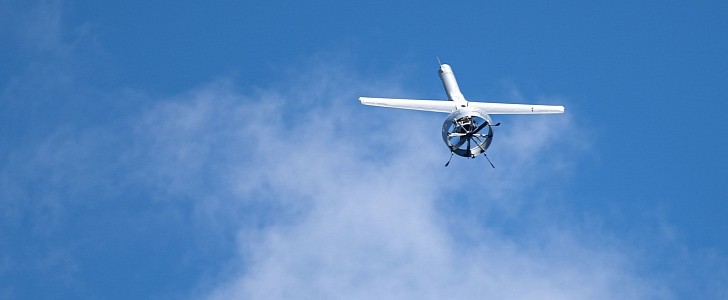Martin UAV and Northrop Grumman have successfully completed flight testing of a V-BAT drone as part of the U.S. Army's Future Tactical Unmanned Aircraft System (FTUAS) mission. The tests focused on the V-BAT's new GPS-denied navigation and target designation capabilities.
Martin UAV's V-BAT is an electric-powered tail-sitter capable of hovering and navigate at high-speeds. Weighing up 84 lbs (38 kg), the aircraft features an increased endurance of up to 11 hours, and higher thrust was made possible by utilizing a more powerful engine, the Suter TOA 288 model.
While hovering and in forward, wing-borne flight, the aircraft employs an onboard flight control system for altitude stability and control. The V-BAT has a wingspan of 9.7 feet (3 meters) and is capable of reaching speeds of over 90 knots (106 mph/ 167 kph) at altitudes of 20,000 feet (6,096 meters).
V-BAT was designed for runway and equipment-independent launch and recovery in remote locations with no external support. The drone can be transported in the bed of a truck and set up in under 30 minutes by two personnel.
Depending on mission requirements, the aircraft can also carry a variety of interchangeable payloads, such as electro-optical/infrared (EO/IR), synthetic aperture radar (SAR), and electronic warfare (EW) payloads.
Recently, V-BAT was flight-tested as part of the U.S. Army's Future Tactical Unmanned Aircraft System (FTUAS) mission. The upgraded V-BAT was outfitted with a GPS-denied navigation system and target designation capabilities.
"The enhanced V-BAT offers a near-zero footprint, flexible vertical take-off and landing (VTOL) capability that is based on a platform deployed operationally today, to address the U.S. Army's Future Tactical Unmanned Aircraft System (FTUAS) mission," said Kenn Todorov, sector vice president and general manager, global sustainment and modernization, Northrop Grumman.
Shield AI's recent acquisition of Martin UAV will also allow for the rapid development of GPS-denied and autonomy capabilities via the company's Hivemind autonomy system.
While hovering and in forward, wing-borne flight, the aircraft employs an onboard flight control system for altitude stability and control. The V-BAT has a wingspan of 9.7 feet (3 meters) and is capable of reaching speeds of over 90 knots (106 mph/ 167 kph) at altitudes of 20,000 feet (6,096 meters).
V-BAT was designed for runway and equipment-independent launch and recovery in remote locations with no external support. The drone can be transported in the bed of a truck and set up in under 30 minutes by two personnel.
Depending on mission requirements, the aircraft can also carry a variety of interchangeable payloads, such as electro-optical/infrared (EO/IR), synthetic aperture radar (SAR), and electronic warfare (EW) payloads.
Recently, V-BAT was flight-tested as part of the U.S. Army's Future Tactical Unmanned Aircraft System (FTUAS) mission. The upgraded V-BAT was outfitted with a GPS-denied navigation system and target designation capabilities.
"The enhanced V-BAT offers a near-zero footprint, flexible vertical take-off and landing (VTOL) capability that is based on a platform deployed operationally today, to address the U.S. Army's Future Tactical Unmanned Aircraft System (FTUAS) mission," said Kenn Todorov, sector vice president and general manager, global sustainment and modernization, Northrop Grumman.
Shield AI's recent acquisition of Martin UAV will also allow for the rapid development of GPS-denied and autonomy capabilities via the company's Hivemind autonomy system.





